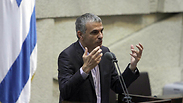
Moshe Kahlon
צילום: גיל יוחנן
Popular former Likud minister announces comeback
Moshe Kahlon will return to politics but not with the Likud, which he claims has fallen prey to the 'radical right' which has pulled it away from core social issue. 'Netanyahu and I never saw eye to eye.'
Moshe Kahlon announced he is returning to politics Tuesday. A highly popular former Likud minister credited with revolutionizing prices in Israel's communications market, Kahlon slammed the Likud in an exclusive interview with Yedioth Ahronoth, ending months of speculation he would return to his original political home.
Kahlon served as the Communications Minister in Prime Minister Netanyahu's previous government and took on the large mobile service providers, opening the market to new players and leading to a drastic drop in prices. At the time, he was hailed as the center-right response to the social protest movement which galvanized growing anger at cost of living prices in Israel.
Related stories:
- PM: Kahlon won’t be appointed Land Administration head
- Kahlon: Moving on is natural
- Parties slam PM over Kahlon appointment
Despite his immense popularity, Kahlon, 54, surprised fellow Likud members by not participating in the last elections and led many to speculate he would open up his own political party.
"I have decided to return to politics," he told Ynet's paper Tuesday, adding "I just don't know with which framework yet… I have an issue with returning to the Likud as it is today."
"Radical rightist in the Likud forced it fold the social-economic flag for political-security gains. The Likud will pay for this. We need to remember that many Likud voters want a more social Likud."
For Kahlon, this seems to be a political, personal and historical question pertaining to the essence of the party he once called home: "The question is what is the Likud? Likud for me was the Likud of Menahem Begin, who also represented a social vision: Reducing gaps between the rich and poor, renewing poor neighborhoods, social rehabilitation, and education reform. It was a pragmatic Likud that knew how to make peace when needed. That is Likud for me."
According to Kahlon, "that Likud no longer exists today, and I struggle to accept some of the things taking place within the party.”
Kahlon laments the loss of his original party, saying the change was substantial and connected to priorities: “Likud is a way of life, Likud is social consciousness, Likud is compassion and carrying for the weak,” Kahlon said.
“But Likud is no longer there, it has deviated from the path. In recent years Likud’s social banner has been folded, and that's a shame. Once it had two flags – the social and political – but now it has only one, maybe one and a quarter."
Kahlon further claimed that the he was not alone and that there were many in the Likud who felt the party had lost its way: "It is no secret that there are many who share my option and feel it is no longer their home. This is a process which began in 2011, with the social issue increasingly ignored.
"It also took place at personal level, all kinds of organizations have taken over the Likud because they understand it will continue to lead the country and should thus be influenced from within, and I'm talking about the radical right."
Kahlon blamed party leadership for allowing the more radical right elements to lead the party's agenda: "The leadership needs to decide to deal with these issues head-on…The Likud knows how to decide when it wants to, they can decide to go against this process, but they are being dragged along, maybe it's convenient for them."
Regardless, Kahlon will not return to the Likud, as reality on the ground has proven to him that the party will not change its ways: "The bottom line is this… the (Likud-led) government has been in place for almost five years, and all we see is negative results: Negative results regarding cost of living, negative results regarding the brain drain, negative results regarding food and hosing costs. The feeling today is very bad."
After his rise to political prominence, Netanyahu attempted to harness Kahlon to aid the Likud in the elections. After Kahlon quit, Netanyahu hoped he would lead the prime minister's land reforms for the National Land Administration, but a coalition agreement with Naftali Bennett's Bayit Yehudi party killed the appointment.
However, Kahlon stresses a more ideological aspect in regards to his relations with Netanyahu: "He always understood there was an ideological clash between us regarding social policy, always, even in party meetings. Along the way we never saw eye to eye on these issues. I supported the social protest movement, I though it was just. I assume this was something that angered (Netanyahu) very much."
Senior Likud member and Interior Minister Gideon Sa’ar told Army Radio: “Kahlon is my friend, we meet and talk even now that he is removed from public life. Politics is not a place for friendship, so I’m not going to argue with him. I still hope he finds his way back to Likud. It is his natural place and home.”
Foreign Minister Avigdor Liberman also told Army Radio that he appreciated Kahlon. “I welcome his return to politics regardless of what framework he runs for office.”










